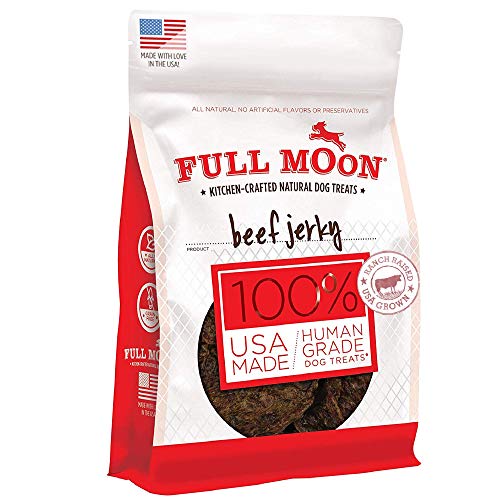The Complete Guide to Dogs Eating Beef Jerky: Good or Bad?

Canine Bible is reader-supported. We receive affiliate commissions via some of our links. Learn more.
Yes, dogs can eat beef jerky in moderation, but there are several important factors to consider before adding it to your pup’s diet. While plain, homemade beef jerky without added salt, spices, or preservatives can be a protein-rich treat, many store-bought varieties—especially those made for humans—contain excess sodium, artificial flavorings, and preservatives that can harm dogs. Plus, what about spicy jerky or those flavored with onion or garlic powder? Are commercial jerky treats made for dogs a safer alternative? Can too much jerky lead to digestive issues or long-term health problems? This guide will explore the benefits, potential risks, and the safest way to incorporate beef jerky into your dog’s diet.
What Is Beef Jerky for Dogs?
Beef jerky for dogs is similar to human beef jerky but is specifically formulated for canine companions. It contains pure, high-quality protein without the high sodium levels or potentially toxic ingredients like onions. Beef jerky is made through dehydration, a process that removes moisture from the meat and concentrates its nutrients. This method compresses approximately one pound of beef into just four ounces of jerky.[1]
Types of Beef Jerky
| Type | Summary |
|---|---|
| Homemade Beef Jerky | Safe for dogs if made without salt, spices, or preservatives. Stick to plain, lean cuts. |
| Human Beef Jerky | Often high in sodium and flavored with toxic ingredients like garlic or onion. Avoid feeding to dogs. |
| Dog-Formulated Beef Jerky | Made specifically for dogs with safe ingredients. A healthier and safer choice than human jerky. |
Is Beef Jerky Good For Dogs?
Beef jerky can be a tasty and protein-rich treat for dogs when specially made for canine consumption and given in moderation.
Beef jerky offers a healthier nutritional profile than many traditional dog treats. The low heat used during dehydration preserves more nutrients and minimizes nutrient loss. This process also retains the natural taste and flavor of the beef, making it highly palatable for dogs.
Important: Always choose jerky specifically made for dogs. Avoid giving human beef jerky, as it often contains high sodium, spices, or harmful preservatives. Stick to plain, natural, and vet-approved options.
Benefits
100 grams (3.5-ounce oz) of dog-friendly beef jerky contains the following nutrients:
Beef Jerky Nutrition Chart (100g)
Nutrient Analysis
| Component | Description | Nutritional Value (per 100g of Dog-Friendly Beef Jerky) | Safe for Dogs? |
|---|---|---|---|
| Water | Low due to dehydration | ~3g | ✅ Safe |
| Calories | Concentrated energy source | ~410 kcal | ✅ Safe (moderation) |
| Protein | Supports muscle development | ~33g | ✅ Safe |
| Fat | Provides energy and supports skin & coat | ~9g | ✅ Safe |
| Carbohydrates | Very low; beef is naturally low in carbs | ~3g | ✅ Safe |
| Fiber | Minimal digestive aid | ~0.5g | ✅ Safe |
| Sodium | Can be high in some products | ~590mg | ⚠️ Check label (low-sodium preferred) |
| Iron | Supports red blood cell production | ~4.1mg | ✅ Safe |
| Zinc | Supports immune system and skin | ~5.3mg | ✅ Safe |
| Phosphorus | Supports bone and teeth health | ~240mg | ✅ Safe |
| Magnesium | Supports enzyme function | ~21mg | ✅ Safe |
| Potassium | Supports nerve and muscle health | ~370mg | ✅ Safe |
| Vitamin B12 | Essential for nervous system function | ~2.0µg | ✅ Safe |
| Niacin (Vitamin B3) | Supports metabolism | ~6.0mg | ✅ Safe |
| Cholesterol | Natural in beef; needed in moderation | ~50mg | ✅ Safe |
| Artificial Preservatives | May cause health issues long-term | Varies by brand | ❌ Avoid (choose preservative-free) |
| Onion/Garlic Seasoning | Toxic to dogs | — | ❌ Unsafe |
| Overconsumption | Can lead to excess sodium or calorie intake | — | ⚠️ Limit portions |
Risks & Considerations Before Feeding Beef Jerky to Dogs
While dog-friendly beef jerky can be a high-protein treat, it’s important to understand the risks and feeding guidelines:
Can Dogs Eat Beef Jerky Made for Humans?
No, dogs should not eat beef jerky made for humans as these treats most likely contain ingredients unsuitable for dogs. Here is a breakdown:
| Risk Factor | Why It’s Harmful to Dogs |
|---|---|
| Sodium Content | Human beef jerky can contain 500–590mg of sodium per ounce—far above the recommended 200mg/day limit for dogs, risking salt poisoning. |
| Spices | Common spices like garlic and onion (allium family) are toxic to dogs, damaging organs and red blood cells. |
| Sugars | Some jerky contains xylitol, which is highly toxic to dogs and can cause dangerous drops in blood sugar. |
| Highly Processed | Store-bought jerky often includes preservatives and chemicals that may raise homocysteine levels up to 10 times than store bought kibble diets, increasing the risk of inflammation and disease such as cancer. |
Sources: [6],[7],[8],[9]
The FDA has warned that certain beef jerky brands intended for human consumption can be hazardous for dogs. Since 2007, the FDA has received reports of illnesses in pets associated with consuming jerky treats made for people. These illnesses include gastrointestinal upset, kidney failure, liver diseases and death in dogs.[10] Some brands, specifically from China, have been linked with cases of poisoning and death in dogs.[11]
Can Beef Jerky Kill Dogs?
The FDA linked beef jerky made in China to over one thousand canine deaths. Nevertheless, it’s safe to say that dog-friendly and even human-intended beef jerky won’t kill your dog. Inspect the ingredients before feeding them to your dog and avoid beef jerky products made in China.
Are Dogs Allergic to Beef Jerky?
Most dogs are not allergic to beef jerky, and it’s generally considered safe for canine consumption. However, some dogs may develop an allergic reaction, as with any food. Food allergies in dogs typically manifest as itchy skin, hives, infections, and anaphylaxis (a medical emergency) in severe cases. If you suspect your dog is having an allergic reaction to any food, including beef jerky, it is crucial to consult a veterinarian.
Additionally, conducting an at-home dog allergy test like the 5Strands can help determine if your dog is allergic or intolerant to certain foods. For a more comprehensive approach, consider an at-home dog gut health test, like the Embark Gut Health Test, which can provide deeper insights into your dog’s digestive health and immune function. These tests can identify food sensitivities, bacterial imbalances, and other underlying issues contributing to allergies, helping you take proactive steps to prevent discomfort and support your dog’s overall well-being.
Risks
The following symptoms may indicate a bad reaction to beef jerky.
What to Do If A Dog Reacts Badly to Beef Jerky
Dogs showing worsening symptoms, such as blood in their vomit or stool, difficulty breathing, weakness, or collapse, should be taken to the veterinarian immediately.
1. Contact a veterinarian immediately: Even if your dog seems fine, contact your veterinarian or an emergency pet poison hotline right away. This includes services such as the ASPCA Animal Poison Control Center at 1-888-426-4435 or the Pet Poison Helpline at 1-855-764-7661. If you can’t reach your vet, you can chat live with a registered online veterinary professional via our online vet chat or video chat support (24 hours a day, 7 days a week). You can also schedule an at-home veterinary appointment with The Vets, a mobile veterinary service that provides at-home vet care nationwide for just about everything.
2. Gather important information: When speaking to a vet, provide: Quantity consumed (estimate if unsure), time of ingestion, and dog’s weight and breed (to assess potential risk).
3. Follow veterinary instructions: The vet may suggest monitoring at home or emergency treatment at the clinic.
- Keep your dog calm and prevent them from eating anything else.
- Be prepared to transport your dog to the vet quickly if advised.
- Bring any remaining beef jerky or packaging to help the vet assess the situation.
How to Safely Feed Beef Jerky to Dogs
When feeding beef jerky to your dog, it’s important to follow a few simple guidelines to keep them safe:
Ways to Feed Beef Jerky to Dogs
As with any new food, starting slowly and feeding gradually is recommended to give the digestive system time to adjust.
Best Beef Jerky Dog Treat
For those who want to give their dog a flavorful, high-protein treat made with quality ingredients, Full Moon Beef Jerky offers a wholesome and delicious option. Crafted with USDA-inspected, human-grade beef and free from fillers or artificial additives, these soft jerky strips deliver a savory source of protein that supports muscle maintenance, energy, and overall health—perfect for dogs of all sizes.
How Much Beef Jerky Can Your Dog Eat?
Treats should only constitute 10% of your dog’s diet, with the remaining 90% coming from well-balanced dog food. This guideline also applies to healthy treats like beef jerky. Below, you’ll find general guidelines for safely portioning beef jerky based on your dog’s weight.
Remember that dogs’ maximum daily sodium intake is 200 mg. To be safe, check the sodium levels of each piece.
| Dog Size | Suggested Serving Size (Jerky) | Breed Examples |
|---|---|---|
| Extra-small (2–15 lbs.) | ½–1 strip (broken into small pieces) | Chihuahuas, Maltese, Yorkies, Shih Tzu |
| Small (16–25 lbs.) | 1–2 small strips | Beagles, Boston Terriers, Dachshunds |
| Medium (26–60 lbs.) | 2–3 strips | Bulldogs, Basset Hounds, Border Collies |
| Large (61–90 lbs.) | 3–4 strips | Labrador Retrievers, Pit Bulls, Boxers |
| Extra-large (91+ lbs.) | 4–5 strips | Great Danes, Bullmastiffs, Saint Bernards |
Can Puppies Eat Beef Jerky?
Yes, puppies can eat beef jerky—but only in moderation and in very small amounts. Since puppies have sensitive digestive systems, start with a tiny portion—such as a pea-sized piece of plain, dog-formulated jerky—to see how they react. Feeding too much jerky at once may lead to digestive upset or excessive protein intake, which can be hard on a developing system. Always choose jerky specifically made for dogs without added spices, sodium, preservatives, or artificial flavors. Avoid human-grade jerky, especially varieties containing garlic, onion, or added sweeteners, as these can be toxic to puppies. When introducing beef jerky or any new treat, avoid combining it with other unfamiliar foods so you can monitor for signs of sensitivity or allergies. If your puppy experiences any digestive issues, introduce only one new item at a time. After offering a small test piece, wait a few days before increasing the amount.
Tip: Cut jerky into soft, bite-sized pieces to prevent choking, and avoid hard or overly dry jerky until your puppy is older.
Can Pregnant Dogs Eat Beef Jerky?
Yes, pregnant dogs can moderately consume plain beef jerky. Beef jerky is high in protein and fat, which is critical for a healthy pregnancy.
Frequently Asked Questions
The Bottom Line
Beef jerky can be a tasty treat for dogs if it is plain and contains no extra seasonings, preservatives, or other hazardous ingredients. Remember that too much sodium and fat from beef jerky can lead to health issues like pancreatitis, stomach upsets, or obesity; therefore, it is essential to carefully monitor the amount of beef jerky given to your pup. When in doubt, consult your veterinarian regarding safe treats for your pet. They will help you navigate the best option for your furry friend’s health. It is important to note that beef jerky should not be a substitute for your pup’s regular diet; it should only be used as an occasional treat. Therefore, feed them appropriately and always practice responsible pet ownership!
Like It? Subscribe & Share!
Sources
Canine Bible uses only high-quality sources, including peer-reviewed studies, to support the facts within our articles. Read our editorial process and product review methodology to learn more about how we fact-check, test products, and keep our content accurate, reliable, and trustworthy.
- USDA Jerky & Food Safety
- PubMed:Dietary Protein
- Selenium & Dogs
- Fanconi Syndrome
- Pet Food-Associated Dietary Exogenous Thyrotoxicosis
- Sodium CDC
- Nutrient Requirements of Dogs & Cats
- Metabolic Diversity
- Circulating Homocysteine
- FDA Investigates Jerky Pet Treats
- NBC News
Canine Bible authorship represents the unified voice of our entire editorial team and our in-house veterinarians rather than a single author. Each article, blog post, and review published under the Canine Bible name undergoes a rigorous review process, involving all team members to guarantee accuracy and up-to-date in accordance with the latest veterinarian research. This collaborative effort is an integral part of our editorial process and aligns with our four pillars of content creation. This approach ensures our content is backed by expert knowledge and factual information, offering our readers reliable, actionable, and trustworthy content.









